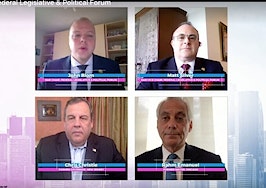U.S. Senator Kamala Harris will be the vice presidential candidate on the Democratic ticket this November, which may have some in the real estate industry wondering what they’re in for if she wins. Harris’ record on real estate so far is mixed, battling mortgage companies on one hand and refusing to prosecute mortgage fraud on the other.
During the housing bust-induced Great Recession, as California Attorney General, one of Harris’ signature accomplishments was helping negotiate a $25 billion settlement with the nation’s five biggest mortgage servicers over robo-signing practices. The March 2012 settlement called for mortgage servicers to pay $5 billion in fines and commit to a minimum of $17 billion in homeowner relief, including principal reductions. Another $3 billion was earmarked for helping underwater borrowers refinance. The senator touted going up against the banks when she was on the campaign trail in her own presidential campaign.
But critics say the settlement fell short of its promises and didn’t keep many Californians in their homes. According to news outlet The Intercept, “that settlement is best understood as a second bank bailout, protecting legally exposed mortgage fraudsters while doing little to prevent evictions. In fact, more families lost their homes as a result of transactions facilitated by the national mortgage settlement than those who got a sustainable loan modification to save them.”
Also as California Attorney General, Harris introduced the California Homeowner Bill of Rights, legislation designed to protect California homeowners facing foreclosure. It was signed into law in July 2012, drawing praise from consumer groups and criticism from some in the industry, including the California Association of Realtors. The legislation stalled the foreclosure process while mortgage servicers reviewed applications for a loan modification.
Opponents of the legislation worried that slowing the foreclosure process would hamper a housing market recovery. A study commissioned by the California Mortgage Bankers Association and other financial services organizations at the time concluded that the legislation would help only “a tiny fraction” of homeowners who were behind on their payments and increase costs for loan servicers, reduce home values, and make credit less available to California homebuyers by raising the risk of lending.
C.A.R. opposed the legislation because the trade group thought it would “encourage the filing of lawsuits intended for delay and further discourage lending” and slow the foreclosure pipeline that constituted about half of California’s home sales at the time. The law was credited with subsequent lower foreclosure rates, though foreclosures were already plummeting at the time the law was signed, according to real estate data firm ForeclosureRadar at the time.
Provisions of the law were set to expire in 2018, but most were re-enacted. Current California Attorney General Xavier Becerra invoked the law in a letter to 33 mortgage servicers last week reminding them of their legal obligations when dealing with homeowners struggling due to the coronavirus pandemic.
The National Association of Realtors and the California Association of Realtors both told Inman they do not engage in presidential elections and therefore declined to comment on Harris’ record.
“As Attorney General during the foreclosure crisis, she was actively involved in the national mortgage settlement and other legislation in that arena, but like most Attorney Generals in the past, was not involved in the areas of real estate-related legislation that C.A.R. is active in,” a C.A.R. spokesperson said via email.
In 2013, Harris decided not to prosecute then-CEO of OneWest Stephen Mnuchin for alleged mortgage fraud-related crimes despite receiving a memo from a year-long investigation by prosecutors in her office who said they “uncovered evidence suggestive of widespread misconduct” in foreclosures conducted by OneWest.
The memo surfaced in 2017, during Mnuchin’s confirmation hearings, when Harris was a new U.S. senator. The Intercept noted at the time that Mnuchin had donated $2,000 to Harris’ Senate campaign in 2016 and that OneWest investor George Soros also donated to her campaign in 2015.
More recently, as a 2020 presidential candidate, Harris re-introduced the Rent Relief Act in April 2019, which would create a new, monthly refundable tax credit for households whose housing costs exceed 30 percent of their income, including rent and utilities.
“Housing is a human right, and we must act now to end the affordable housing crisis and provide relief to working families who are worried about making each month’s rent,” Harris said in a statement at the time.
“Right now, nearly half of Americans couldn’t afford an emergency $400 expense — these families need help now. This is about more than just economics — it’s about the basic security and dignity that every American deserves to have in their own home.”
But in California, where home price increases are driven by extremely low inventory, experts warned that the legislation could have the unintended effect of incentivizing landlords to raise rents for everyone, according to The Sacramento Bee.
The legislation would not address the need for more housing, according to Jenny Schuetz, a housing policy expert in the Metropolitan Policy Program at the Brookings Institution in Washington, D.C. “Landlords collectively are likely to increase their asking rents for all apartments if they expect that some group of people in the city will have more money to spend on rent. This just gives more money to landlords without fixing the underlying problem,” she told the news outlet.
The Rent Relief Act is currently stuck in committee. Since then, Harris has teamed up with Democratic congresswoman Maxine Waters to introduce the Housing is Infrastructure Act in November 2019, which would invest $107 billion in affordable housing.
And just this week, on Aug. 10, Harris introduced a bill to provide mortgage relief and eviction relief for renters related to the COVID-19 pandemic. Although the text of the bill is not yet available, in a press release Harris announced her Rent Emergencies Leave Impacts on Evicted Families (RELIEF) Act would ban evictions and foreclosures for a year, give tenants up to 18 months to pay back missed payments, ban rent increases, and prohibit landlords and mortgage servicers from reporting unpaid rent to credit reporting companies.
The legislation would also prohibit utility companies from shutting off access until January 2022, prohibit the use of Paycheck Protection Program funds to purchase foreclosed or distressed properties, and direct the Congressional Oversight Commission established by the CARES Act to monitor property management companies that received PPP loans, according to Politico.
“We are in the midst of multiple crises in our country: a public health crisis, which has killed over 135,000 people, and an economic crisis due to millions of Americans losing their sources of income,” Harris told Politico. “And we are now facing a housing crisis as a result of both.”
“Instead of stepping up to help folks keep a roof over their heads, [the Trump] administration is focused on putting taxpayer dollars in the pockets of big corporations,” she added. “We need to know that wealthy landlords aren’t using federal assistance to benefit themselves while putting families out on the street.”
Email Andrea V. Brambila.
Like me on Facebook | Follow me on Twitter













